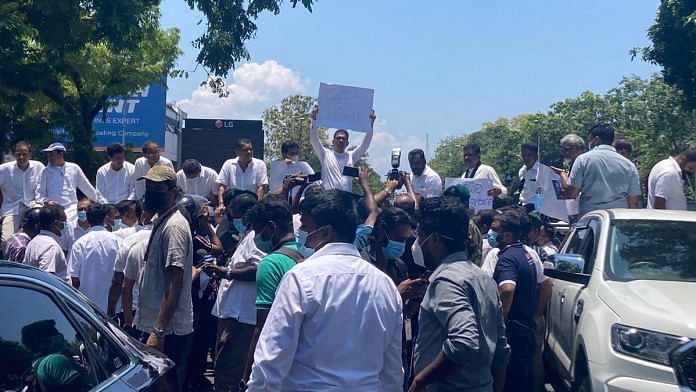Since last month, the Ukraine-Russia war has intensified and hundreds of thousands of Ukrainian people have fled to neighbouring countries. At the same time, India’s southern neighbour Sri Lanka has dived into an economic crisis, and its people are fleeing. Both countries are on different continents, facing different crises. Vladimir Putin’s hubris and nostalgia imposed war on Ukraine. But Sri Lanka and its government policies forced the country’s citizens to flee to India. They are fleeing because the country is facing its worst economic crisis since its independence, with shortage of food, fuel, and fertiliser. Sri Lankans are forced to stand in queues for food, fuel, and other essential commodities.
The army is deployed at petrol pumps to curb people because the situation may go out of hand. The Gotabaya Rajapaksa government says the economy deteriorated because of the Covid crisis. However, that is not the sole reason for Sri Lanka’s current situation.
In 2019, Gotabaya Rajapaksa was sworn in as the president of Sri Lanka. After assuming power, his government cut tax rates. This decision worsened Sri Lanka’s balance sheet. According to The Week, these cut tax rates made revenues dive to a historical low of 9 per cent of GDP. It is a solid example of how a majoritarian government often takes decisions without thinking.
The pandemic gave another shock to Sri Lanka’s economy. It hit the country’s tourism sector, which is a huge source of earnings and foreign exchange for the country. Tourism contributes 10 per cent of Sri Lanka’s GDP. Thousands of its citizens working in the Gulf countries who would send remittances back to the country were also hit by the pandemic, and lost their incomes.
The country had yet not stabilised when the Rajapaksa government on 6 May 2021 passed a resolution that made an agricultural policy and switched to organic farming. It created massive distress among farmers. Farmers lost their income and the country lost its food production as organic farming disrupted supply chains in the country. It also affected food distribution and rationing. After this policy failed, the government restricted the imports of essential food items from other countries to save dollars. Now, Sri Lanka’s retail inflation stands at 17.5 per cent, the highest in Asia, and food inflation stands at 25.7 per cent.
These issues arose in the last two or three years. According to an article by former deputy governor of Sri Lanka’s central bank, WA Wijewardena, in the Deccan Herald, after 2005, Sri Lanka overwhelmingly borrowed money from Japan, China and India. It brought Sri Lanka into a debt trap. Its exports fell from 26 per cent in 2005 to 12 per cent in 2020 and the economy shrunk from 9 per cent in 2012 to 2.3 per cent in 2019. The pandemic contracted the economy by 3 per cent. Sri Lanka’s foreign reserves stood at $2 billion at the end of February. Its public debt stands at nearly 110 per cent of the GDP. The Gotabaya government is now approaching the International Monetary Fund. The fact is that the economy had been shrinking since 2012 but the government’s inertia brought its people into starvation.
What can be the lessons take away from this economic crisis? First, don’t take sudden economic steps that shake your economy. In 2016, the Modi government’s announcement of demonetisation crumbled the Indian economy. Sir Lanka did something similar in the decision on organic farming. Over the last decade, Sri Lanka heavily depended on Chinese money and has not produced enough income within the country, and only concentrated on the domestic economy. It lead the country away from the global economy. Last but not least, populism should not take over a prudent economy.
The author is a student at Haridev Joshi University of Journalism and Mass Communication, Jaipur. Views are personal




